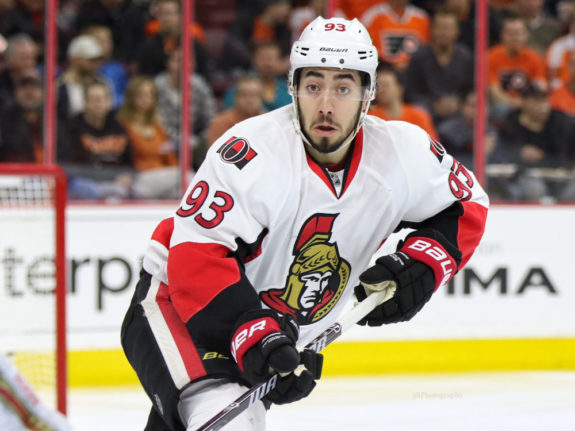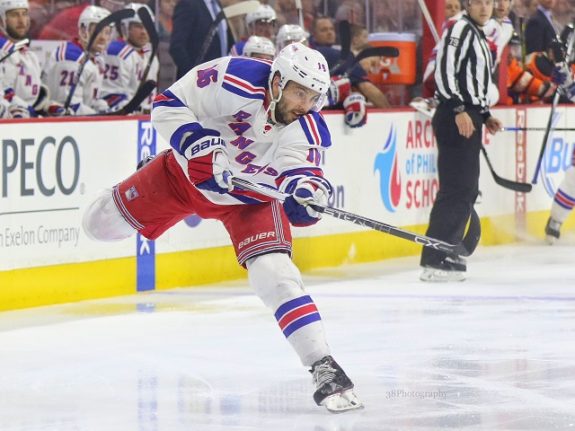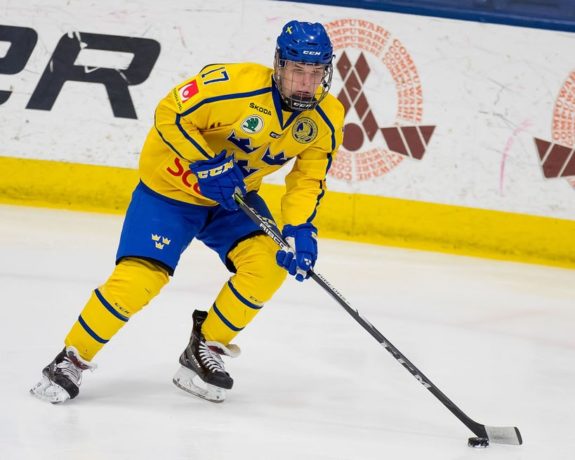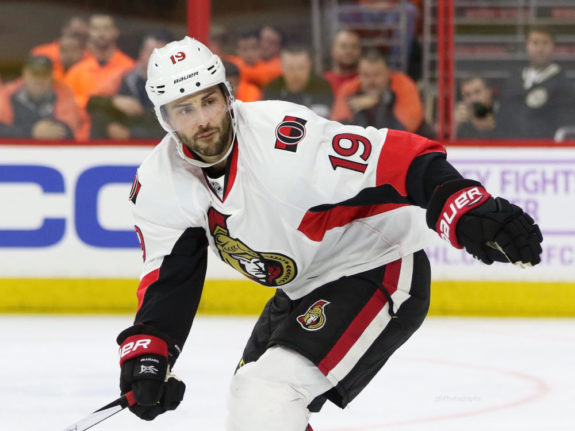
 Ben Fraser
The Hockey Writers
Ben Fraser
The Hockey Writers
39
Reads
0
Comments
Ottawa Senators: Revisiting the Zibanejad Trade
The Ottawa Senators have made mistakes in the past and mismanaged their assets. One of their biggest errors was the trade involving Derick Brassard and Mika Zibanejad.

On July 18, 2016, the Senators traded Zibanejad to the New York Rangers, as well as a 2018 second-round pick for Brassard and a 2018 seventh-round pick. While the second-round pick that Ottawa gave up would not be used by the Rangers, this trade was a win for New York from the start.
Related: Ranking the Senators’ 1990s First-Round Picks
Hindsight is 20/20, but this trade dealt a major blow to the Senators and their progress in becoming competitive. It gave the Rangers a legitimate star forward, who before the 2019-20 NHL season was paused, was on pace for 90 points and 50 goals, despite missing a significant amount of time early in the season. Brassard, who is now a New York Islander, did not live up to the potential he showed in Manhattan.
Prelude to the Trade
Leading up to the trade, Zibanejad had recorded his second straight 20-goal season and set career-highs in points. He was developing, albeit slowly, into the player that warranted his sixth-overall selection at the 2011 NHL Draft.
Related: 5 Worst Trades in Ottawa Senators History
While Zibanejad was not pegged as a pure scorer, his shooting percentage was just under 11 per cent for his career. His peak goal-scoring season was in 2015-16 with the Senators, when he scored 21 goals on an 11.4 shooting percentage. While higher than his average, it wasn’t a significant number. Still, it was possible to predict that he would be at least a 20-goal scorer in the prime of his career. He was also only 22 years old at the time, and about to enter his prime.

Brassard, who was drafted sixth overall in 2006 by the Columbus Blue Jackets, was traded to the Rangers as a part of the deal that sent Marian Gaborik to the Blue Jackets on April 3, 2013. Through his 254 games as a Ranger, he scored 174 points, including a 60-point season in 2014-15. He was a good player, but with red flags.
Brassard was 28 years old at the time of the trade, already in his prime, and six years older than Zibanejad. Furthermore, his best year in New York was during the 2015-16 season, when he scored at nearly a 15 per cent rate. This was a three per cent increase on his career average at the time.
While Brassard had the talent to be a consistent NHL player, his 27-goal season was influenced by a higher shooting percentage and the result of better luck. He was also born across the river from Ottawa in Hull, Quebec and was very excited to be joining the Sens.
Money Always Talks
While Zibanejad and Brassard were having career seasons, Ottawa had their reasons for moving Zibanejad. The Senators and Rangers were both having cap issues. The Senators didn’t have the cash to acquire or re-sign their star players, but they did have the flexibility to take on big cap hits that represented little actual money. The Rangers had several high-profile restricted free agents (RFA) like Chris Kreider to sign and needed to dump salary.
Related: Ottawa Senators Legend – Chris Phillips
The trade made business sense at the time. Zibanejad was an RFA after the 2016-17 season, coming off a cheap contract worth only $2.625 million per year. The final year of the contract was worth $3.25 million in salary, and he was due for a significant raise. Brassard carried a big cap hit of $5 million but was only owed $3.5 million in actual salary during the last two seasons. Financially, trading the two wasn’t a bad idea, but it was not a good hockey trade.
The Pieces That Were Dealt
After almost four years, the trade continues to look worse for the Senators. Since the trade, Zibanejad has become the first-line centre that the Senators hoped he would be. In 267 games as a Ranger, he has scored 233 points. He is also an alternate captain and has established himself as part of the Rangers’ one-two punch with Artemi Panarin.
Related: New York Rangers Should Make Signing Zibanejad a Priority
The second-round pick that Ottawa gave to New York ended up in the hands of the Detroit Red Wings after the Rangers traded it for defenseman Brendan Smith in 2017. The Red Wings later drafted Swedish centre Jonatan Berggren, 33rd overall, who plays with Skelleftea AIK in the Swedish Hockey League.

As for Brassard’s tenure in Ottawa, it was largely underwhelming. His first season in 2016-17 was not as advertised or expected by management. With only 39 points in 81 games, his previous success was forgotten, especially in the eyes of the tougher Canadian media.
While he was unluckier than in past seasons, only shooting at seven per cent, it was still unacceptable. However, his regular season was overlooked with the Senators’ run to the 2017 Eastern Conference Final and his performance in the playoffs. His 11 points in the postseason were tied for third on the team.

The following season was a vast improvement. At the time Brassard was traded, he had 38 points in 58 games, and he was displaying why he was so highly touted in both Columbus and New York. However, it was too late as Ottawa had hit rock bottom, and began to trade away assets.
Brassard’s time in Ottawa ended on Feb. 23, 2018, when he was traded to the Pittsburgh Penguins. He had 77 points in his short 139 game career as a Senator. The package they got from the Penguins helped redeem Dorion. Brassard was also disappointing as a Penguin, and only stayed in Pittsburgh until the following trade deadline when he was sent to the Florida Panthers. He made another stop with the Colorado Avalanche, before becoming an Islander in 2019. He was having a decent comeback year in Long Island with 32 points in 66 games before the 2019-20 NHL season was paused.
The seventh-round pick Ottawa acquired was used on American born centre Luke Loheit. He is playing for the University of Minnesota-Duluth Bulldogs, where he had a lacklustre rookie season with only one goal and six points in 33 games.
Final Thoughts
By looking at the names involved in this trade, you know it’s one the Sens lost by a wide margin. It may be easy to say that the Rangers robbed the Senators but you must also consider the mitigating factors that were involved.
No matter how you feel about the Senators’ financial situation, hockey is still a business. In order to run a franchise, especially one like the Senators, you must make decisions that make the most of your available funds. This trade was based in a business decision that blew up in Ottawa’s face.
I’m not defending this trade. It is the worst of Dorion’s tenure and one of the worst in Sens history. With that said, there was more involved in the trade than just getting rid of Zibanejad for Brassard.
The post Ottawa Senators: Revisiting the Zibanejad Trade appeared first on The Hockey Writers.
Popular Articles

















































 Canucks Vancouver
Canucks Vancouver Sharks San Jose
Sharks San Jose Flames Calgary
Flames Calgary Avalanche Colorado
Avalanche Colorado Coyotes Arizona
Coyotes Arizona Golden Knights Vegas
Golden Knights Vegas Wild Minnesota
Wild Minnesota Red Wings Detroit
Red Wings Detroit Blues St. Louis
Blues St. Louis Blackhawks Chicago
Blackhawks Chicago Blue Jackets Columbus
Blue Jackets Columbus Hurricanes Carolina
Hurricanes Carolina Jets Winnipeg
Jets Winnipeg Predators Nashville
Predators Nashville Ducks Anaheim
Ducks Anaheim Oilers Edmonton
Oilers Edmonton Sabres Buffalo
Sabres Buffalo Rangers New York
Rangers New York Bruins Boston
Bruins Boston Panthers Florida
Panthers Florida Senators Ottawa
Senators Ottawa Lightning Tampa Bay
Lightning Tampa Bay Capitals Washington
Capitals Washington Islanders New York
Islanders New York Devils New Jersey
Devils New Jersey Maple Leafs Toronto
Maple Leafs Toronto Flyers Philadelphia
Flyers Philadelphia Penguins Pittsburgh
Penguins Pittsburgh Stars Dallas
Stars Dallas Kraken Seattle
Kraken Seattle Kings Los Angeles
Kings Los Angeles






